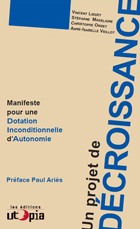 Published in Moins!, the swiss journal about political ecology.
Published in Moins!, the swiss journal about political ecology.
Over the last few years the idea of a living or basic income has been the object of more and more debates. Nevertheless it is quite difficult to make sense of it in view of the plethora of names referring to it and the ideas they entail; even more if we follow the history of this proposal, a basic income has been endorsed by some neo-liberals. Thus, Milton Friedman intended to attribute a set amount of money to the “certified poor”.
What is the Unconditional Autonomy Allowance (UAA)?
At the heart of the propositions of some Growth objectors, the Unconditional Autonomy Allowance (UAA) is shaping up as a social and economic tool able to initiate a democratic and serene transition towards societies based on Degrowth, caring for Nature and humans, sustainable and above all desirable.
The UAA encompasses our thoughts on what should be the first of all degrowths; degrowth in inequalities. Therefore it is necessarily coupled with an Acceptable Maximum Income (RMA – Revenu maximum acceptable).
The UAA integrates the logic of free access for reasonable usage and penalties for misuse (i.e. water, electricity and heating) without having recourse to Euros: it puts into question the monetary principle itself and replaces it with local or social currencies. This is where the UAA differs from a basic income because it is not solely paid in Euros. This is the biggest difference between the UAA and the basic income: the UAA constitutes a tool for a progressive transition out of capitalism and the religion of the Economy through free access and usage as well as the re-appropriation of monetary creation outside the realm of the market, whereas a basic income accompanies the downfall of capitalism.
But what does differentiates the UAA from other “ basic income”?
In fact, even if we acknowledge that the establishment of a basic income amounts to a social improvement mainly as a tool for social justice and decentralisation of the value of work, we think that is not a goal in itself. It could even become a palliative measure for a sick society, that will only address some marginal symptoms (inequalities, exclusions) without addressing the root of the problem: productivism, capitalism, consumerism, and in general the absurdity of a Growth society.
A basic Income does not question, and does not even raise any question about the content and meaning of our consumptions and productions. On the contrary, the aim of the UAA is that we reappropriate the meaning of our lives: what do we produce, how, for what usage?
Re-politicise society and re-socialise politics!
The UAA is also a tool for the re-politicisation of society by encouraging the citizens to take control in a democratic and participative manner: what is a frugal and decent lifestyle? How to organise society so that all of us can live in dignity? How can we share the heavy-duty tasks? What does good usage mean, what constitutes misuse of the same resources?
This is how the UAA would be distributed: in right of access (housing, transport, workshop, piece of land, etc.), in right of usage (water, electricity, gas, etc.), a payment in fluid local currencies (restricted to the purchase of local and sustainable products to promote an open relocalisation and a social and supportive economy) and eventually a small part paid in Euros (or national currencies). Its content and form would have to be debated and discussed in a democratic manner at a local level.
The aims is to find mechanisms to protect people from the fear of the future and the Other, which could allow us to initiate a decolonisation of our imaginaries (more specifically the economistic one) together with a transition towards a sustainable Degrowth (relocalisation and transformation of our productions and consumptions), a serene Degrowth (re-appropriation of democracy through an autonomous society) and a convivial Degrowth (a different rapport with the Other and time: working less to live better).
Vincent Liegey, Christophe Ondet, Anisabel Veillot et Stéphane Madelaine, French Degrowth movement members.
To be published: Un projet de Décroissance : Manisfeste pour une Dotation Inconditionnelle d’Autonomie,
Vincent Liegey, Anisabel Veillot, Christophe Ondet and Stephane Madelaine, Edition Utopia, Janvier 2013.
http://www.projet-decroissance.net/



Ping : A springboard for a Degrowth Project: the citizens’ initiative for a basic income. | Manifeste pour une Dotation Inconditionnelle d'Autonomie